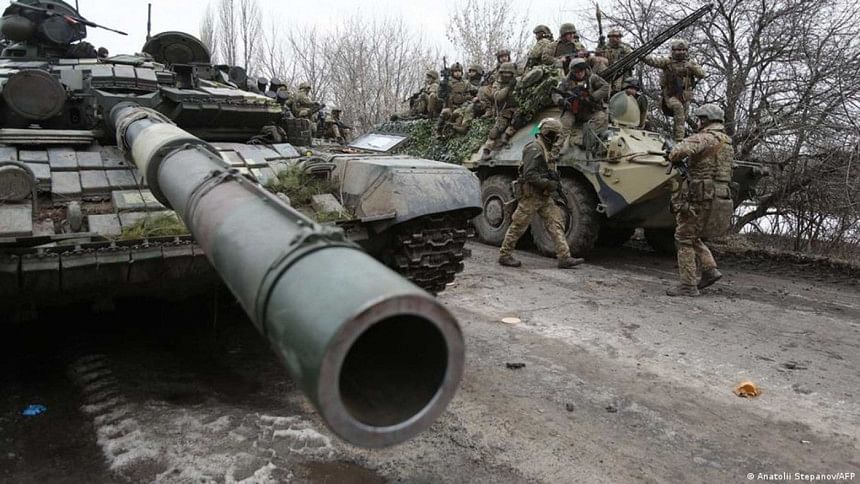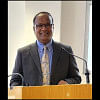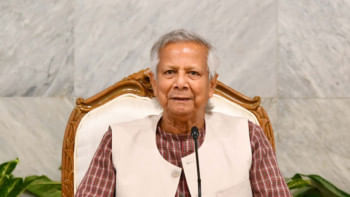To attain peace, we have to demarket war

When the troops were being pulled out from Afghanistan, I was thinking where the next theatre of war would be. Ukraine was the last spot on my mind. It was also not in the high alert list of the Council of Foreign Relations, which regularly tracks these types of conflicts.
Two Slavic nations with close cultural ties are in conflict—brothers fighting brothers. The horrors of war are difficult to take. Deaths and destructions are piling up with no end in sight. The Western backing has given a new meaning to the war. It has turned out to be a contest between Russia and the West on Ukrainian soil.
Russia will not be able to continue a protracted war with economic sanctions and political isolation. It did not face anything like this in Chechnya or Georgia. The war has pushed Russia to a corner. It is an existential threat for the nuclear superpower. Can this lead to World War III? We will not be alive to confirm.
Wearing olive green shirt, the media savvy Ukrainian president is on the charm offensive. On April 5, 2022, he addressed the United Nations Security Council. In the Western media, he is being portrayed as a hero championing freedom. However, winning the media is different from winning the war.
The UN Secretary-General Antonio Guterres told the Security Council, "The war in Ukraine must stop—now." It is "one of the greatest challenges ever to the international order… We need serious negotiations for peace, based on the principles of the United Nations Charter."
Negotiations are taking place in Turkey. Both parties are evaluating the conditions on the ground and speculations about victory. So far, we have not seen any positive outcome. The world should strongly support Turkey's President Erdogan's peace initiative. Pressure must be put on both parties to come to a settlement.
Quest for a rationale
Russia is surrounded by many former Soviet Bloc countries who are now members of the European Union and Nato. Ukraine was just another nation that wanted to join this club. Why was it so different this time?
The answer lies in Crimea—which Russia annexed in 2014. For strategic reasons, Soviet-era naval base and entry to the Black Sea were critical for Russia. It also wanted to see a friendly government in Ukraine. There was a possibility that after joining the military alliance, Ukraine could try to retake Crimea with Nato's support.
Given this, Putin had two bad choices: (i) fight Ukraine today; or (ii) fight Ukraine and Nato tomorrow. For him, fighting today was a better choice—a pre-emptive military move that made him the aggressor.
Placing a nation on a "war path" for a "membership" does not indicate good leadership. It is not a good trade-off, especially when nearly half of the Ukrainians were opposed to joining this organisation. As a country, Thailand has not been invaded by any external power in 1,000 years. The comedian president could learn from the Kingdom.
Now it is an old story to consider. The conditions on the ground have advanced very fast. Military and civilian causalities have overtaken the issue.
Strangulation by sanctions
Sanctions are legitimate civil courses of actions against any nation that does not follow the international order. Ever since the establishment of the United Nations in 1945, they have been used against belligerent countries.
Sanctions have mixed reactions. They weaken or embolden the leadership at home. Sufferings of the people increase but the regimes remain in power.
Nations are more permanent than their leaders. In the absence of Putin, Russia may inherit a leader who could be more hostile. Hitler came to power protesting against the strangulation of Germany stipulated by the Treaty of Versailles—the rest is history.
History repeats itself. In Bangla we say, "ek maghe sheet jai na." The consequence of this war could be shockingly fatal.
Poor suffer the most
On April 5, 2022, the UN Secretary-General Antonio Guterres stated in the Security Council that the conflict will increase the prices of food, energy and fertiliser affecting up to 1.2 billion people in 74 countries.
Historically, we have noticed that European conflicts have the potential to expand beyond the continent. Both World Wars started in Europe. America joined later. Rest of the world (some as colonies had no choice) were drawn into it against their will and have suffered miserably.
Nearly three million people died in the Bengal famine during World War II. The deceased people never heard the name of Churchill, Hitler, Mussolini, or Tojo.
The poor nations in Asia, Africa, and Latin America are facing political and economic pressure to side with the sparring parties. The people in these countries will be the unfortunate collaterals.
Bangladesh will be dealt a heavy economic blow if its access to the Western garments market is closed. Bangladesh, Egypt, Iran, and Turkey buy 60 percent of their wheat from Russia and Ukraine. Bangladesh should take preventive measures, if possible.
Global governance architecture
The United Nations Secretary General is right. The war reveals one of the greatest challenges of the international order since World War II.
Unipolar world is as bad as monopoly in economics. There is no force on the planet that can counter the diktat of the West and Nato combined. Both China and Russia have some deterrence, but they are distant rivals to the West's economic, social, and political might. The non-aligned nations do not have the political power to stop a war like this.
We should seriously consider restructuring (perestroika?) the global governance architecture. Discussion should include Security Council membership, political power-sharing, dollar-based trade regime, ethnolinguistic fractionalisation, religious tolerance, and global inequality.
During the past 75 years, the economic and military landscape of the world has changed substantially. Restructuring the global governance architecture is likely to face serious challenges. Emerging nations should come forward to make a difference in global governance.
Demarket the current war
It is noticeable how the Ukraine war is being marketed to the American public. Below are my appeals to demarket the war.
1. Stand still and roll back: The moral justification of the current war is weak. It has the potential to prompt World War III. A prolonged war and stalemate benefit the war industry as the body count increases. The situation is not acceptable to our conscious. Let us stand still and roll back.
2. Moral suasion: There is no better alternative than moral suasion. Academic, journalists, politicians, conscientious people, and social media—all must come forward to play their role. Active opposition against war can change minds. For example, the death of four students at Kent State University (my Alma Mater) on May 4, 1970, literally stopped the Vietnam war.
3. Responsible media: To portray someone as a hero and the other as a villain in any conflict does not help the peace process. De-escalation and negotiation should be the focus of the media. The media must play a constructive role. Positive discussions must follow this line of thought.
4. Non-aligned leadership: Historically, leaders of the nonaligned nations have played a positive role in superpower conflicts. Lately, the movement has lost its impetus. The leaders of the emerging nations must take proactive measures to break the stalemate.
Our hegemonic desire to control the world and its resources puts us in conflicts. As a consequence, the war industry thrives. President Eisenhower noted this in his Farewell Address to the nation on January 17, 1961.
"This conjunction of an immense military establishment and a large arms industry is new in the American experience… Yet we must not fail to comprehend its grave implications… Only an alert and knowledgeable citizenry can compel the proper meshing of the huge industrial and military machinery of defence with our peaceful methods and goals, so that security and liberty may prosper together."
As a paradigm, demarketing war is likely to face natural opposition from the industry that benefits from war. Yet then peace efforts must continue.
Dr Abu Waheeduzzaman is a Professor of Marketing and International Business at Texas A&M University-Corpus Christi.

 For all latest news, follow The Daily Star's Google News channel.
For all latest news, follow The Daily Star's Google News channel. 



Comments